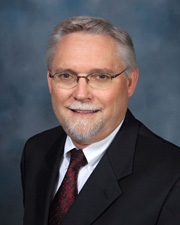 |
Lynell Klassen, M.D. |
NOTE: This profile is part of a series highlighting the 26 researchers who were named UNMC Distinguished Scientists or New Investigators for 2007. Each of these researchers will be profiled in UNMC Today leading up to a March 20 ceremony to recognize their achievements.
- Name: Lynell Klassen, M.D.
- Title: Henry J. Lehnhoff Professor and chairman of the UNMC Department of Internal Medicine
- Joined UNMC: 1982
- Hometown: Lehigh, Kan.
Briefly describe your research in laymen terms, please.
To understand how the body recognizes proteins as being either normal “self proteins” or normal or abnormal “foreign proteins.”
This ability of the immune system to discriminate between self and non-self proteins is the basis for understanding how the body reacts to infectious agents, the spread of malignant cells and the development of autoimmune diseases, such as systemic lupus erythematosus and rheumatoid arthritis.
What led you to pursue this area of research?
During a summer research experience as a medical student, I worked in the laboratory of Dr. Clifford Gurney, an experimental hematologist. His work involved early studies and understanding the development of the immune system in the bone marrow. I was fascinated with the intricacies of how an immune system developed and how it was controlled. Later, I was able to receive in-depth training in immunology at the National Institutes of Health (NIH), which, at that time, was one of the leading centers for research in immunology. Throughout my career, I have always been fascinated by both the intricacy and the simplicity of how the body’s immune system responds to both external and internal influences.
How do you see your research contributing to science?
The most significant contribution has been to understand how very minute changes on one’s own proteins can cause the body to respond and react to otherwise normal tissue. In addition, many of these small changes are the consequence of normal metabolic processes that occur within the body. These observations have led us to understand that many of the disease processes are the result of abnormal regulation of otherwise fairly normal cell-to-cell interactions. The significance of these observations is applicable to many diverse fields in medicine.
Why did you become a scientist?
As a medical student, I was intrigued by the ability to use animal models to try to understand human diseases. This seemed like a more exciting approach than simply observing and describing what occurs in patients. The reason I remained involved in scientific investigation is that it offers the opportunity to ask new questions, to try to figure out how to answer those questions and then to apply the findings to understanding why people might develop diseases.
What is your hope for the next generation of scientists?
The greatest thrill in science is discovering new concepts and proving whether one’s new ideas are right or wrong. Unless the discovery of new facts and ideas produces a sense of enjoyment, science becomes tedious. My hope is that all scientists continue to marvel at how biology and physics interact to allow cells, tissues and intact organisms to survive and function.
Beyond grant funding, how do you measure success?
Success in research is essentially developing a new idea, proving that idea is correct and having others agree that your idea is correct. This, of course, primarily involves publications, which require sustained financial support (grants). However, the greatest measure of success is to have other scientists think of your work as important and exciting and to have younger scientists choose to work in your area and, in fact, to exceed successes that you have had.
What would you tell a student interested in a research career?
There is nothing that is more enjoyable or more rewarding than being paid to discover new ideas and concepts.
Do you have a hero/role model? If so, what do you admire most about them?
The only true hero I have ever had was my father. He was a man of extraordinary talent. He demonstrated an ability to be interested in new things. He seemed to always have an idea about how to fix any problem and he approached other people with a unique blend of gentleness and firmness.
Tell us about your family and hobbies outside of the lab.
I’ve been married for 40 years to a most remarkable woman. Jolene has a unique ability to bring out the best in those with whom she is associated. She runs her own piano studio — she loves to teach children a joy for music. I have four children, three of whom graduated from UNMC’s College of Medicine, the fourth graduated from UNMC’s College of Pharmacy. My non-medical hobby is attempting to complete home improvement projects. Most of them work out quite well, although delayed completion times usually irritate my wife. I also enjoy reading on a variety of topics — including history, theology, physics and politics.
List three things few people know about you.
- I was a competitive middle distance runner in high school and college. In high school, I set the Kansas indoor and outdoor record in the 880-yard run;
- In high school, I experimented with rocketry and almost destroyed my father’s combine in an aborted launch;
- My first research experience included fishing for swine parasites in a large tank of pig doo-doo at a packing plant.